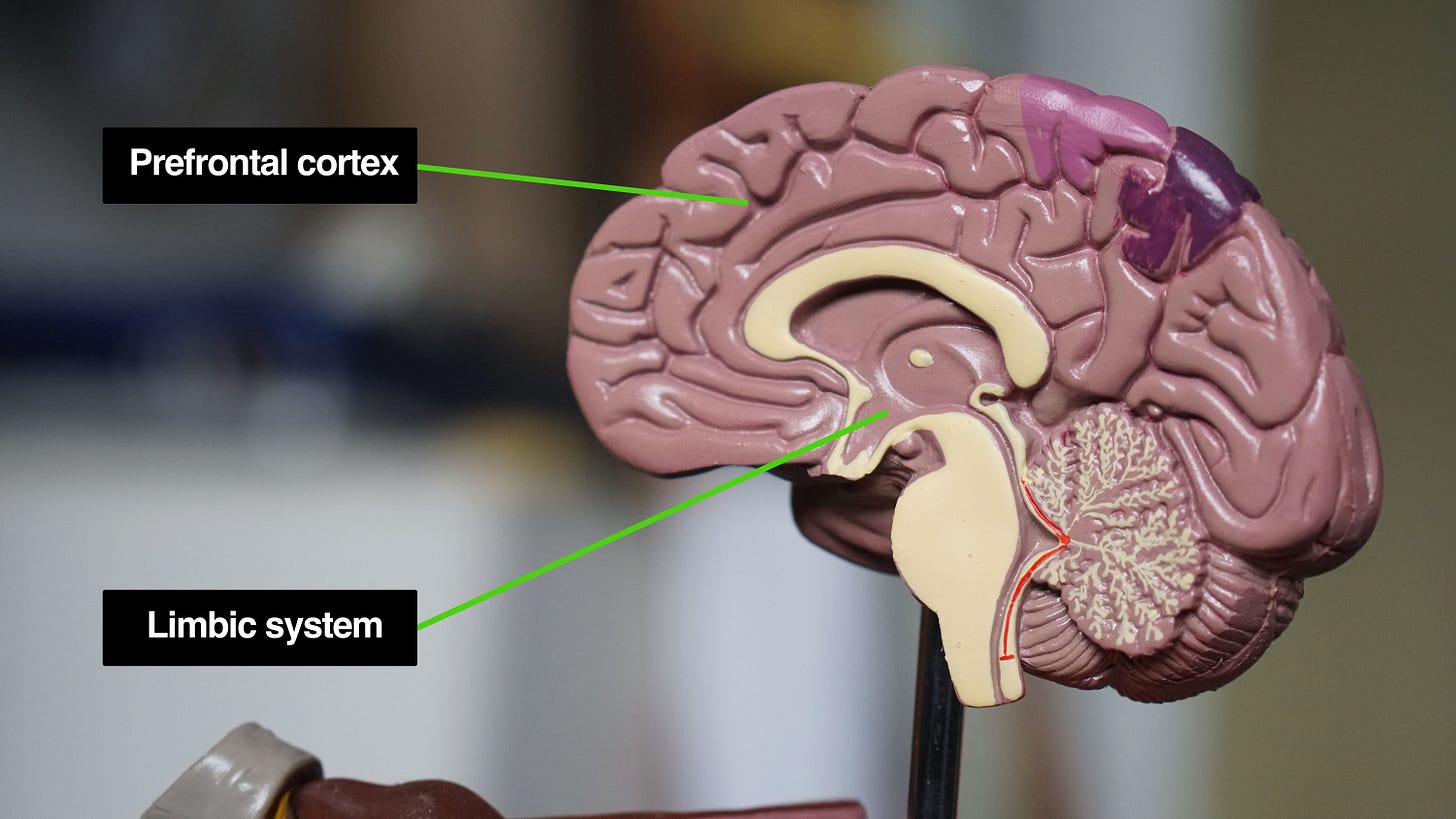Are you addicted to control?
And is your gut suffering as a result?
In one of my many professional lives, I worked as a nutritional neuroscientist providing support to people experiencing addiction, anything from gambling and sex to drugs and alcohol. It’s interesting that most of them were addicted to control. Even more interestingly, they all had gut health issues. And I know that because I used to run gut microbiology tests on them. Invariably they’d have a deranged gut microbial ecosystem (aka dysbiosis), as well as high intestinal permeability (aka leaky gut) and more “bad bugs” (aka pathogens) than beneficial microbes like your Bifidobacterium, Lactobacillus, or your butyrate producers Faecalibacterium and Roseburia, just to name but a few.
Why was this happening? And what can you do about it? I’ll just give you a bit of a news flash here. It’s to do with the brain-gut connection, and the solution isn’t just food/nutrition/supplements. In fact, you can follow the best “gut health diet” in the world and still suffer tremendously from gut health issues. And that’ll be particularly true if you’re addicted to control.
Let’s break it all down
Firstly, I’ll define what being addicted to control is and the kind of behaviours that you’re likely to see in someone who is addicted to control.
Then I’ll explore the brain structures that are firing all cylinders in control situations and how they effect the gut.
At this point, it’s your turn to become an active part of the process. I am sharing with you a wabi-sabi brain training tool that entails breathing, visualisation and a mantra that you repeat to activate certain anatomical areas of the brain. Practising will help calm down your gut’s nervous system as well as your whole hypothalamus-pituitary-adrenal (HPA) axis. And it comes as a handy mini-guided brain workout audio that you can play directly from this email.
I’ll review the anatomical areas of the brain that you’re working out when you do this brain training exercise and what the effects of the activation of these brain areas are on the mind and the body.
I’ll explain the benefits you can expect to achieve if you do this regularly, particularly what on the gut-brain axis.
All of this is fully referenced, so there’s plenty of further reading for you if you’re interested in going deeper. Shall we get started? 🥰
What does addiction to control even mean?
The phrase "addicted to control" refers to a psychological tendency where a person obsesses with maintaining control over any/all aspects of their life. Some people take it to the extreme, and they even obsess over controlling various aspects of the lives of others. Addiction to control can happen in personal or professional settings and includes trying to control outcomes, situations, people, or even their own feelings and thoughts. It is often driven by a fear of uncertainty, a desire for predictability, or a need for security.
Although the term "addiction" is not usually applied to this context in a clinical sense, there is a scientific basis to suggest that human brains find it easy to become "addicted" to control because the anatomical regions of the brain involved in control do a great job at talking to each other. The prefrontal cortex, especially its ventromedial and orbitofrontal regions, is heavily involved in planning, decision-making, and self-regulation. The brain is like a muscle. The more you exercise a particular area, the stronger it becomes. People who feel a need to control may have an overly active or dominant pre-frontal cortex as they constantly seek to predict, plan, and influence outcomes. On the other hand, the amygdala, the primadonna of the limbic system, plays a significant role in our emotional responses, particularly fear and anxiety. The need for control often stems from a fear of uncertainty or the unknown or from anxiety about possible negative outcomes. For that reason, people with a strong need for control might also have an overly responsive amygdala.

Here are a few evolutionary reasons why our brains find it easy to get addicted to control:
Predictability and survival: Our brains are wired to predict and control our environment to ensure our survival. This drive dates back to our early human ancestors, who needed to anticipate potential threats and resources in their environment. Imagine your grand-grand-grand-grand x 10,000 mother. She would have needed a certain degree of desire for control as a natural way to navigate her world effectively.
Dopamine and reward: The brain's reward system involves the release of dopamine, a neurotransmitter associated with feelings of pleasure and satisfaction. When we successfully control a situation to achieve a desired outcome, it can lead to the release of dopamine, which reinforces that behaviour and makes us want to repeat it. The only tricky thing about dopamine is that it can prime both positive and negative behaviours. In fact, dopamine is involved in both positive and negative neuroplasticity. Imagine you decide to eat only lettuce for a week because you’ve listened to a podcast by Miss Thing, and you think it’s a great idea. You lose 3 kilos in a week. That gives you a dopamine boost. But you feel rubbish, and your gut is struggling. Your digestion is all over the place, and you’ve not been to the toilet in 2 days. Are you likely to prioritise the dopamine hit and carry on with this silly diet at the expense of your gut feeling? Probably yes. And that’s called negative neuroplasticity, a brain adaptation that reinforces negative thought patterns, emotions, and behaviours, making them more ingrained and harder to change over time. It’s a slippery slope, but we’ve all done it. And dopamine makes you want to do it even more. It is what dopamine does. Make you want to do things, even when they’re not necessarily good for you.
Avoiding anxiety: Control can be a way of managing anxiety and fear. When we feel in control, this reduces uncertainty and makes us feel safer. The amygdala, the brain's fear centre, becomes less active when we feel in control, which can be a relief and therefore reinforce the need for control. However, this is another slippery slope. Control is a way of numbing emotions. I controlled every aspect of my diet for over 20 years. From strict vegan to strict gluten-free, dairy-free, lectin-free. You name it. I’ve done it. You may have too. Did it “cure me”? No, it didn’t. But it allowed me to continue to gaslight myself to think that it was having some kind of positive effect. It also allowed my brain to trick me. While I was busy controlling my diet, I wasn’t thinking about my childhood trauma. That way, my brain was protecting itself because brains are selfish, and they prioritise self-protection.
Cortisol and stress: Control, or lack thereof, is closely linked with stress. When we feel out of control, our bodies release more cortisol, the stress hormone. This can create a negative physiological state that we seek to avoid, which can enhance the desire for control. And that’s yet another slippery slope. The more we seek to avoid being out of control, the deeper into the pickle we get. And it ain’t a pickle that’s good for your gut!
What kind of things do control addicts do?
People who are addicted to control tend to micromanage. They’re likely to have a hard time delegating tasks or trusting others to perform tasks to their satisfaction. They’re also likely to find it difficult to relax and let go. If you’re always feeling the need to be doing something, or if you over-plan things or have difficulty dealing with unforeseen circumstances, that’s also a control addiction red flag.
If you or someone you know have a hard time accepting ideas or solutions from others, even when they're good ones, just because you didn't come up with them yourself, that can be a sign that you crave perfection. Nothing ever feels good enough. This can manifest in low tolerance for mistakes, by yourself or by others. It can also mean that you’ll avoid tasks where you’re not 100% confident you’ll succeed because showing vulnerability is scary. This can be extremely tiring, even if you don’t realise it. As a recovering perfectionist, I have been there, and it was thoroughly exhausting, but I could see why I was doing it. In a subconscious way, I feared uncertainty. Some control addicts may also use manipulation tactics, such as guilt, blame, or criticism, to control others.
The most crucial thing to remember about an excessive need for control is that it can have extremely detrimental effects on both physical and mental health. The number one effect tends to be a high level of chronic stress and anxiety. Let me tell you about my lived experience. I was a gluten-free vegan travelling extensively around Eastern Europe in the early 2000s. I would land in Budapest at 10 pm, where it’d be almost impossible to find a vegan dinner, so I’d go to be with an empty stomach. I’d be knackered and cranky the following day but wouldn’t accept that my body wasn’t designed to handle that sustained level of stress. I was pushing myself too hard in an attempt to manage every detail of my life, studying for my nutrition degree in the evenings and at weekends, and travelling a few evenings per week, which led me to burnout. Over time, my job got busier, and I started travelling long haul while still trying to control my diet, which was making me miserable. Imagine me trying to do low-carb-low-cal in Jordan. Reflecting back on that time now, I realise that I was so fixated on achieving my diet goals that I had difficulty recognising my own feelings. I often had emotional outbursts, and I definitely internalised distress because I had to present a pleasant, coherent face to the people I was working with, but inside I was messy. I did that for years, carrying bottles of supplements around with me to take on the plane to “fight free radicals” when flying to Canada, swallowing handfuls of 20 different capsules to help with my “gut and liver support” while living out of a suitcase. I see people do this kind of thing all the time, and I feel that such a fixation on control limits personal growth by preventing us from stepping out of our comfort zones, taking risks, and experiencing new things. It can stifle creativity, learning, and overall personal development. In my case, this whole control thing made the gut issues I had since I was a child (a very IBSy gut) much worse. I bloated easily and needed to rush to the loo several times a day.
Yes, so what about the gut?
The central nervous system and the enteric nervous system (the nervous system of the gastrointestinal tract) communicate via the gut-brain axis. This communication happens via different types of messages, including direct and indirect types of channels (aka pathways) involving neural (via the vagus nerve), endocrine (hormones), immune (cytokines), and metabolic (short-chain fatty acids, tryptophan metabolites, bile acids).
When a person is addicted to control, they experience high levels of stress and anxiety. As a result, I’d expect to see the following impacts on the gut through this gut-brain axis. I saw all of this in my clinics for years, and I experienced a few myself. Do you resonate with any of the below?
High-stress levels can alter gut motility (the movement of the digestive system). This can result in symptoms like constipation or diarrhoea.
Chronic stress can increase intestinal permeability, often referred to as "leaky gut," which can lead to inflammation as the immune system responds to bits and pieces from the gut that enter the bloodstream.
Stress can alter the composition and diversity of the gut microbiota (the trillions of microorganisms living in our intestines), which play a crucial role in our overall health. These changes can impact everything from digestion to the immune system and even mood and mental health.
Chronic stress can increase inflammation both in the gut and throughout the body. This can exacerbate gut conditions like irritable bowel syndrome (IBS) and inflammatory bowel disease (IBD) and may contribute to the development of other health conditions.
Chronic stress can affect digestion and the body's ability to absorb nutrients, which can lead to deficiencies and exacerbate feelings of stress and anxiety.
Stress can increase the gut's sensitivity to acid, leading to heartburn or acid reflux. It can also make your gut more sensitive to sensations, potentially leading to pain, bloating, and discomfort.
Letting go of control
In my experience, when it comes to gut-brain health, 80% is about mindset, and 20% is about actual changes to your diet, supplements, etc. That is why I’ve tapped into another of my past lives as a yoga teacher to share with you a wabi-sabi-inspired mantra meditation that is designed specifically to promote a calmer dialogue between your limbic system (your emotional brain) and your prefrontal cortex (your planning brain). Think of this mantra meditation as planting a seed that will grow from your mind and establish its roots all the way down to your gut and throughout your body, making you bloom like a cherry blossom.
Wabi-sabi is entangled with Japanese philosophy and Zen Buddhism. It teaches about the impermanence of everything and promotes the idea of detachment, not in a sense of disengagement from the world, but in an acceptance that control is an illusion. Instead of trying to control things, wabi-sabi encourages us to accept and adapt to changes as they come. Everything is changing, and nothing lasts forever. This concept stands in stark contrast to the desire for control, which often involves trying to make things static and predictable. Understanding and accepting impermanence can help alleviate the need for control, leading to greater peace and satisfaction. When we are addicted to control, we are preoccupied with the future, planning and trying to predict and influence outcomes. Wabi-sabi, on the other hand, emphasises being fully present in the current moment. Practising this mantra meditation will help you let go of the need to control by helping them realise that the only moment you can truly influence is the present. The idea is to try and accept things as they are without trying to change or control them. This acceptance is the essence of letting go, leading to greater harmony and less suffering. The need for control is often rooted in the ego's desire for self-preservation and dominance. Zen teachings aim to dissolve the ego, move beyond the illusion of a separate self, and realise that all things are interconnected. As we let go of the ego, the need for control also dissipates.
Audio of “I trust. I let go” mantra meditation by Dr Miguel
This simple “I trust, I let go” mantra meditation gives your brain a workout involving a wide range of anatomical areas, from the prefrontal cortex to the anterior and posterior cingulate cortices, the insula, the hippocampus and the amygdala. This is a summary of what 10 minutes of mantra practice are doing to your brain.
You’re activating your parasympathetic nervous system: This mantra meditation helps stimulate the parasympathetic nervous system, which is responsible for rest and relaxation. It can decrease heart rate, slow the breath, and promote a sense of calm and wellbeing. This response can help counterbalance the stress response of the sympathetic nervous system, which might be engaged due to an overactive prefrontal-amygdala chitchat in people with a tendency to be addicted to control.
You’re changing your brainwave patterns: Research has shown that meditation can lead to an increase in alpha and theta brainwaves, which are associated with relaxed and focused states of mind. These brainwave patterns can promote a sense of peace and tranquillity.
You’re reducing amygdala activity: The amygdala, which plays a crucial role in our emotional responses, particularly fear and anxiety, becomes less active during meditation. This could lead to a reduction in the fear or anxiety that often drives a need for control. If you train your amygdala often enough, you’re likely to experience a new, calmer you.
You’re promoting prefrontal cortex changes: Meditation can enhance the functioning and connectivity of the prefrontal cortex, which is involved in focus, decision-making, and emotional regulation. Remember, the goal of this mantra meditation isn't to suppress or control your thoughts but to create a focal point that gently brings your mind back when it starts to wander. Over time, this reminder can lead to greater emotional control and less reactivity, supporting a healthier, more balanced relationship with control.
You’re enhancing the Default Mode Network (DMN): The DMN, which is involved in mind-wandering and self-referential thinking, becomes less active during meditation. This could help an individual stay more present and less lost in thought, supporting the practice of letting go. And this is cute. This is exactly one of the things that happen during psychedelic trips, as scientists have now found.
You’re fostering neuroplasticity: Regular meditation practice leads to structural changes in the brain, a phenomenon known as neuroplasticity. Research has shown increased grey matter density in areas related to memory, empathy, stress regulation, and self-awareness among long-term meditators. Does this not make you want to do this every day now for the rest of your life? ☺️
In summary
We can’t always control everything in our lives, no matter how hard we try. We still do, and sometimes we get so obsessed with getting everything absolutely right that we end up experiencing an attachment to control that’s quite similar to addiction. The way to break this vicious cycle is to learn to trust and let go. The more you train your brain to accept that things are perfect just the way they are, the better you’ll get at it, and the more obvious the results will be.
It's important to note that "letting go of control" doesn't mean becoming passive or not making decisions. Instead, it's about understanding what is within our control and what is not and finding the ability to be at peace with things as they are. It's a practice that takes time and patience, but I’ll be here with you to guide you along the way. This is literally wabi-sabi neuroplasticity 101 in a single post. Hope you found it useful 🙏🏽








Dr. Miguel you were/are a yoga teacher 🎊 , you mentioned vagus nerve.
One of the ways to stimulate vagus and promote deeply parasympathetic response is through ujjayi breathing, with slight constriction on the back of the troat.
I had digest issues and i’ve became mindful of what,how and when i eat. It helps. Great piece🤩
Is there a meditation app/service that you'd recommend? I have ADD as well and struggle with finding one that does not overwhelm me at use and with notifications.